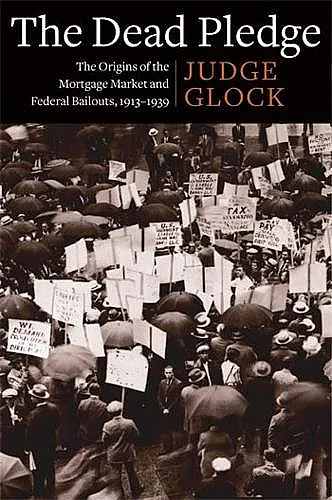The Dead Pledge
The Origins of the Mortgage Market and Federal Bailouts, 1913–1939
Format:Hardback
Publisher:Columbia University Press
Published:6th Apr '21
Currently unavailable, and unfortunately no date known when it will be back

The American government today supports a financial system based on mortgage lending, and it often bails out the financial institutions making these mortgages. The Dead Pledge reveals the surprising origins of American mortgages and American bailouts in policies dating back to the early twentieth century.
Judge Glock shows that the federal government began subsidizing mortgages in order to help lagging sectors of the economy, such as farming and construction. In order to encourage mortgage lending, the government also extended unprecedented assistance to banks. During the Great Depression, the federal government made new mortgage lending and bank bailouts the centerpiece of its recovery program. Both the Herbert Hoover and Franklin Roosevelt administrations created semipublic financial institutions, such as Fannie Mae, to provide cheap, tradable mortgages, and they extended guarantees to more banks and financiers. Ultimately, Glock argues, the desire to protect the financial system took precedence over the desire to help lagging parts of the economy, and the government became ever more tied into the financial world.
The Dead Pledge recasts twentieth-century economic, financial, and political history and demonstrates why the greatest “safety net” created in this era was the one supporting finance.
America's farmers and home buyers long suffered from limited access to mortgage credit. In this engaging book, Glock aptly shows how federal interventions to boost mortgage lending fostered powerful special interests, which subsequently created new imbalances in the economy. That's why we continue to have housing bubbles and crashes. -- Richard Sylla, coauthor of Alexander Hamilton on Finance, Credit, and Debt
From one of the finest in a growing generation of historians writing at the intersection of finance and politics, we learn about the passions and the interests of financiers, politicians, intellectuals, reformers, and farmers who created the system of government-backed finance that has dominated the modern era. The Dead Pledge provides a new history that will guide our ongoing debates about the appropriate role of government in finance and finance in society. -- Peter Conti-Brown, author of The Power and Independence of the Federal Reserve
Judge Glock's fascinating book, The Dead Pledge, provides a new perspective on the evolution of American capitalism and the development of modern financial institutions by exploring the intriguing theme of "economic balance" and its allure to a wide range of economic actors, academics, and policy makers from the Progressive Era through the New Deal. -- Walter Friedman, author of American Business History: A Very Short Introduction and Fortune Tellers: America's First Economic Forecasters
In this sweeping narrative, Glock brings together the histories of American finance, economic thought, and policy making. Glock reframes our conventional understanding of when and how the “financialization” of American capitalism took place, defining it as an early twentieth-century phenomenon. The modern mortgage market, he explains with lucid prose, developed in tandem with—and inseparably from—the modern American state. An engaging read, sure to provoke debate. -- Laura Phillips Sawyer, author of American Fair Trade: Proprietary Capitalism, Corporatism, and the 'New Competition,' 1890-1940
ISBN: 9780231192521
Dimensions: unknown
Weight: unknown
304 pages